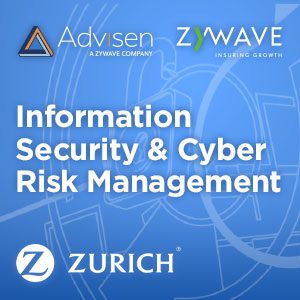By Chad Hemenway, Advisen
Some interesting things have occurred since our Cyber Risk Insights Conference in San Francisco and I am increasingly queasy the more I read and speak to experts.
One cannot consider cyber risk without being aware of the threats posed by nation states. But a new wave of troubling information is upon us. It is becoming increasingly apparent that we need to fight against cyberattacks together because our government agencies admit they can’t do it alone. Are we prepared to do that? How?
The swell began at our conference earlier this month with Robert Anderson, former head of the FBI’s Criminal, Cyber, Response, and Services Branch and current CEO of Cyber Defense Labs, telling us that the U.S. is not exactly approaching cyber risk with the intensity it should.
Read: U.S. way behind cyber threat, says former head of FBI cyber investigations
Following Anderson, and before I could catch my breath in San Francisco, I was reintroduced to Jarrett Kolthoff, a former special agent in U.S. Army Counterintelligence and CEO of SpearTip. He said he had a good piece of contributed content for me for Front Page News (We accept contributed content for FPN regularly. If you have something, send it my way. My email is below). Kolthoff was right, and he added a great deal to the conversation.
Read: Chinese leverage private data breaches for espionage
After arriving back on the East Coast, I was able to arrange a phone call with T. Casey Fleming, CEO of BlackOps Partners, a multi-disciplinary team of top-level, thought leaders from cybersecurity, national intelligence, national law enforcement, cyber law and management consulting.
You may remember, Fleming spoke at our Cyber Risk Insights Conference in London in March 2018.
In 2018, Fleming said: “Our adversaries are a lot better at intelligence than we are,” Fleming said. We—places like the UK and US—are operating in tactical, maybe operational mode. Our Chinese, Russian and North Korean opponents are operating at the strategic level.” He called what is happening now the “Cold War on steroids.”
That was two years ago. I have some additional work to do to get all that Fleming has to say to our audience. But I want you revisit the blog post I wrote after Fleming’s keynote two years ago.
Read: Looking the wrong way through a telescope at strategic ghosts
In an email prior to our recent call Fleming wrote to me: “Perhaps it’s time for an update to the article?”
Fleming told me that our enemies “want to own us.” He said we work off rules of international law. Countries like China, Russia, North Korea and others recognize no law in this regard – “unrestricted warfare,” Fleming said. Anderson made a very similar point in San Francisco.
“We see the carnage every day,” Fleming told me. “They want to defeat us – our democracy, capitalism, the free world – and their efforts have ramped up in an effort to accelerate our demise.”
Fleming forwarded me these stories that I think our audience should read:
U.S. counterintelligence chief warns of broadening spy threat
And I also found this one: National Counterintelligence Plan Calls on ‘Whole-of-Society’ Approach to Tackle Emerging Threats
It’s not a new term but get used to call for a “whole-of-society” approach to cybersecurity. In a statement released with a new report and strategy to combat a growing list of nation-state adversaries, National Counterintelligence and Security Center Director William Evanina said: “With the private sector and democratic institutions increasingly under attack, this is no longer a problem the U.S. government can address alone. It requires a whole-of-society response involving the private sector, an informed American public, as well as our allies.”
Our federal authorities and intelligence agencies are telling us they can’t fight this alone, because attacks against us are bigger than them. Are we ready to fight this together? Do we understand what that means?
Not long ago we found out Russia was already meddling in our election process. (Anderson in San Francisco told us, as he did to 60 Minutes a few weeks prior, that Russia never left after interfering with the 2016 election.) Russia wants to disrupt, disinform, cause chaos, control, inject doubt, get us to point fingers and watch us become divided.
During a recent conference on Capitol Hill, David Porter, an assistant section chief with the FBI’s Foreign Influence Task Force, said Russia wants to watch us “tear ourselves apart.” Mission accomplished, no?
What is a whole-of-society approach look like when we’ve allowed our enemies to create such a chasm between us – when we do not trust each other because of their efforts?
It’s something I’ve thought about recently thanks to our conference speakers and sources, and it’s something we’ll continue to stay on top of as we report, seek new speakers for our conferences and select stories for Front Page News because it appears our critical infrastructure, supply chains, intellectual property, economy and personal privacy are under attack more than ever.
As part of this whole-of-society approach, we welcome your perspectives and ideas. Email me with your thoughts and content.
Managing Editor Chad Hemenway can be reached at [email protected]




